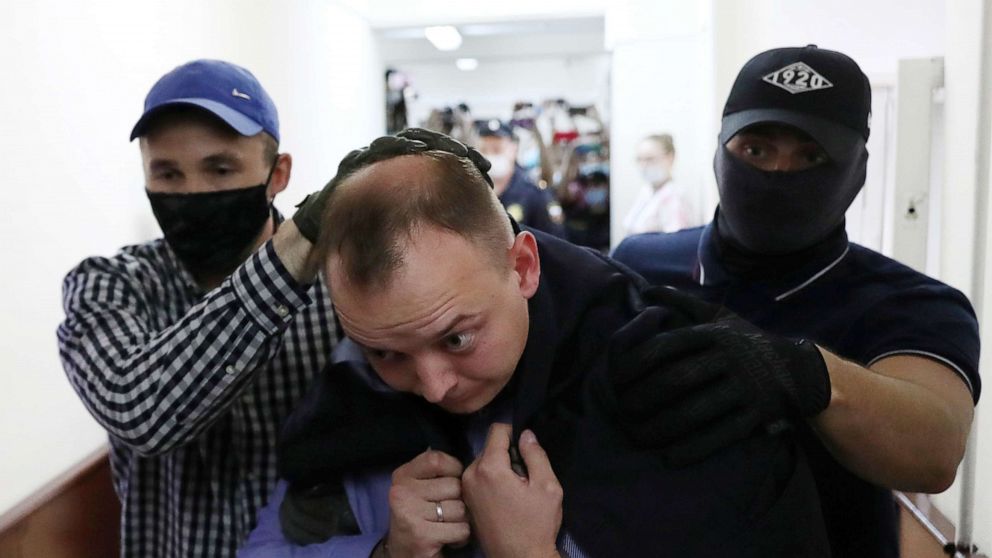[ad_1]
The arrest of a highly regarded former journalist has set off major outcry among independent media outlets in Russia, which are calling the government’s latest actions part of a burgeoning crackdown.
Ivan Safronov, accused of spying for the Czech Republic and United States, was arrested Tuesday morning by agents from Russia’s domestic security service, the FSB, which has accused him of state treason, a charge that carries a possible 12- to 20-year prison term.
Until two months ago, Safronov was a reporter covering Russia’s defense and space industries for a leading newspaper, Vedomosti, having spent a decade covering the same beat at another top paper, Kommersant. Since May, he has been a communications adviser for the head of Russia’s space agency, Roscosmos.
Safronov’s lawyer told reporters on Tuesday the FSB accuses him of passing secret information to Czech intelligence about Russian arms deliveries to Africa and military activities in the Middle East. A Moscow court ordered him held for two months in pretrial detention in the city’s Lefortovo jail.
Former colleagues and journalists from other publications protested his arrest outside FSB headquarters in Moscow on Tuesday, and more than two dozen were detained by police. Three of Russia’s top news outlets, including his two former papers, published protests prominently on their sites, saying the arrest was intended to chill reporting in Russia.
Kommersant, where Safronov worked for a decade, wrote that the accusations seemed “absurd” and called him a “patriot.” Another leading outlet, RBC, wrote that his arrest was “a signal” to Russian media and society not to write about secrets held by powerful people.
Treason cases are classified, meaning Safronov’s trial will be held behind closed doors as even the charges brought against him are likely to remain murky.
His lawyer, Ivan Pavlov, told reporters on Tuesday the FSB alleges Safronov was recruited in 2012 by Czech intelligence and in 2017 allegedly was given the task of passing along intelligence about the arms deliveries and military operations. That information allegedly was shared with the United States, added Pavlov, who told reporters materials for the case filled seven volumes, suggesting the FSB had been building a case against Safronov for quite some time.
The Czech foreign ministry on Wednesday declined to comment when reached by ABC News.
Safronov, 30, is known as for breaking stories on Russia’s highly closed defense sector and had worked in the Kremlin media pool, which travels with Putin. This isn’t his first confrontation with authorities: Last year, he repeatedly was questioned by the FSB over an article he wrote about the sale of Russian warplanes to Egypt.
His father, Ivan Safronov, also was a defense reporter at Kommersant and in 2007 died after mysteriously falling from a window. His colleagues have said they believe he was murdered by Russia’s security services over his work.
Russia’s space agency, Roscomos, has said Safronov had no access to classified material in his role, which he had occupied for just two months. The allegations instead relate to a period when Safronov would have been working as a reporter at Kommersant.
Journalists and other experts said Safronov appears to have been targeted under an expanded definition of the treason law passed in 2012 in response to mass street protests against President Vladimir Putin.
Safronov’s arrest, they said, suggests this law has now been turned on journalists amid a fresh crackdown that has coincided with moves by the Kremlin to extend Putin’s rule beyond his term limits. Last week, the Kremlin won a referendum on constitutional changes that will allow Putin to remain in power until 2036.
Andrey Soldatov, a veteran journalist and expert on Russian security services, said authorities previously had avoided using the treason law against journalists but that Safronov’s case showed the rules had changed.
It “is an absolutely new level of repression against journalism in the country,” Soldatov wrote.
“The FSB is applying its paranoid definition of espionage to journalists — and is going out of its way to make sure everyone knows. What’s more, senior leaders have apparently sanctioned the action,” Soldatov wrote in The Moscow Times.
The expanded law is so broad, Soldatov wrote, the FSB doesn’t need to prove a person was spying, only that they were communicating with any “foreign organization” in order to accuse them of treason.
Safronov was arrested a day after a journalist was convicted in another high-profile case. Svetlana Prokopyeva had faced six years prison for a report critical of security services, but a judge instead fined her about $7,000.
Russian journalists also have compared Safronov’s case to that of Ivan Golunov, an investigative reporter whose arrest on crudely fabricated drugs charges last year sparked an exceptional outcry across elite Russian society, forcing authorities eventually to drop the case.
The U.S. embassy in Moscow on Tuesday tweeted on Tuesday that following Safronov’s arrest, “It’s starting to look like a concerted campaign against #MediaFreedom.”
Russia’s foreign ministry responded by tweeting, “Mind your own business.”
The Kremlin has denied Safronov’s arrest is related to his journalistic work and downplayed the media outcry as “emotional.”
“Let’s not confuse a public response with a media response,” Putin spokesman Dmitry Peskov said in his daily briefing call. “We still presume that it has no relation to his journalistic activity.”
It can’t be ruled out he acted as a spy, Peskov added.
Soldatov, the security services expert, said in reality Safronov’s arrest showed that the Kremlin has unleashed the security services to lay down new boundaries for what can be reported on in Russia.
“Putin has now entrusted the ‘journalist question’ to his security services,” Soldatov wrote in The Moscow Times. “We should be very worried.”
[ad_2]
Source link

